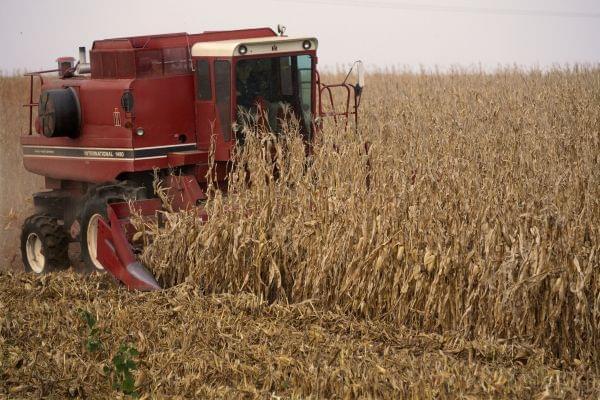How Trade With US Allies Affects Farmers; Homeless Outreach Training For Police; State Politics

Seth Perlman/AP
On the 21st: How a trade war with the United States' allies would affect Illinois farmers. Plus, homelessness advocates in Springfield are hoping to dedicate a police unit as a 'Homeless Outreach Team' to try and prevent the revolving door of homelessness. And, we'll recap the end of the legislative session—which ended with a bipartisan budget, allegations of sexual harassment against a Democratic leader, and a flurry of bills that were passed.
Homelessness is an issue in cities large and small across the state. According to latest figures from the U.S. Department of Housing and Urban Development, there were more than 13,000 people living without homes in Illinois in January of 2017.
In Springfield, at any one time there are about 300 homeless people, which is a number that has grown over the past several years. Now, advocates in Springfield are proposing a new way to reduce repeated interactions between the homelessness population and police in that city in an effort to reduce the number of homeless individuals on their streets.
The proposal would dedicate a specific unit of police they’re dubbing the “HOT” or “homeless outreach team.,” to focus on rebuilding the trust between police and people struggling with homelessness. It would also focus on providing other healthcare workers to their chronic homeless populations and helping them get the services they need.
We had a chance to catch up with Rob Dalhaus late last week. Rob is the director of C-U at Home, a homeless advocacy group in Champaign.
We also spoke with Officer Chris Jones who is with the Springfield Police department - they’re working on having police officers develop a beat specifically for the homeless population. And we spoke with Meghan Golden who is the Assistant Director of Population Health Integration at Southern Illinois University. She’s a social worker who provides therapy for people who are homeless - and works with police departments.
Officer Chris Jones of @SPD_HQ says "I think [Homeless people] do trust us." You have to "see what you can do today to get done tomorrow."
— The 21st (@21stShow) June 4, 2018
A Homeless Outreach Team can provide the first connection between a homeless person and a service provider.
Plus-
The Trump administration last week announced tariffs against our closest allies and trading partners: Canada, Mexico and the European Union. Up until this point we’ve heard lots of talk especially from President Trump.
Here in Illinois, international trade plays a big role in our economy. Canada and Mexico are actually our state’s two largest export markets. Germany is fourth.
When it comes to farms - 2 out of every 10 acres on Illinois farmers are planted to feed Canada and Mexico. But this hits many industries - machinery, chemicals, to name a few.
To talk trade we spoke to Phil Levy. He’s a senior fellow with the Chicago Council on Global Affairs.
We were also joined by Paul Taylor, he’s a corn, soybean and specialty crop farmer in Esmond. He farms about 850 acres in DeKalb County - and he used to be on the Illinois Corn Board. And Brian Duncan, Vice President of the Illinois Farm Bureau joined us on the line. He grows corn and hogs on his family farm.
"At least 99% of economists think this is crazy," says @philipilevy wryly.
— The 21st (@21stShow) June 4, 2018
This hurts us directly, and hurts us indirectly when other countries respond, he adds.@KelloggSchool @ChicagoCouncil
And-
Last week, the General Assembly wrapped up its session for this year. And unlike in recent years, lawmakers and the governor agreed on a spending and revenue plan for the state of Illinois. Governor Rauner signed it this morning at a news conference. We of course had a budget impasse that lasted more than two years. It ended nearly a year ago when the House voted to override Governor Rauner’s veto.
This time, everything went much more smoothly. The Senate voted 56 to 2, and the House voted 94 to 11.
House Minority Leader Jim Durkin joins us now. He’s a Republican representing Illinois’ 82nd House district, which includes suburbs southwest of Chicago including La Grange and Willowbrook.
We also spoke with Amanda Vinicky. She’s a correspondent with WTTW Chicago Tonight.
In terms of our expensive Governor's race..."we can walk and chew gum at the same time."
— The 21st (@21stShow) June 4, 2018
In other words, we're not done with our jobs, even in an election year. @ilhousegop #twill

